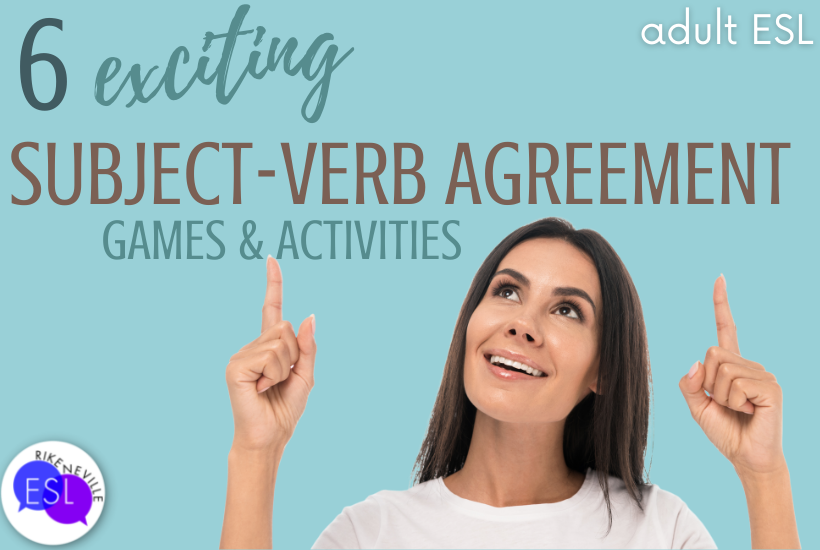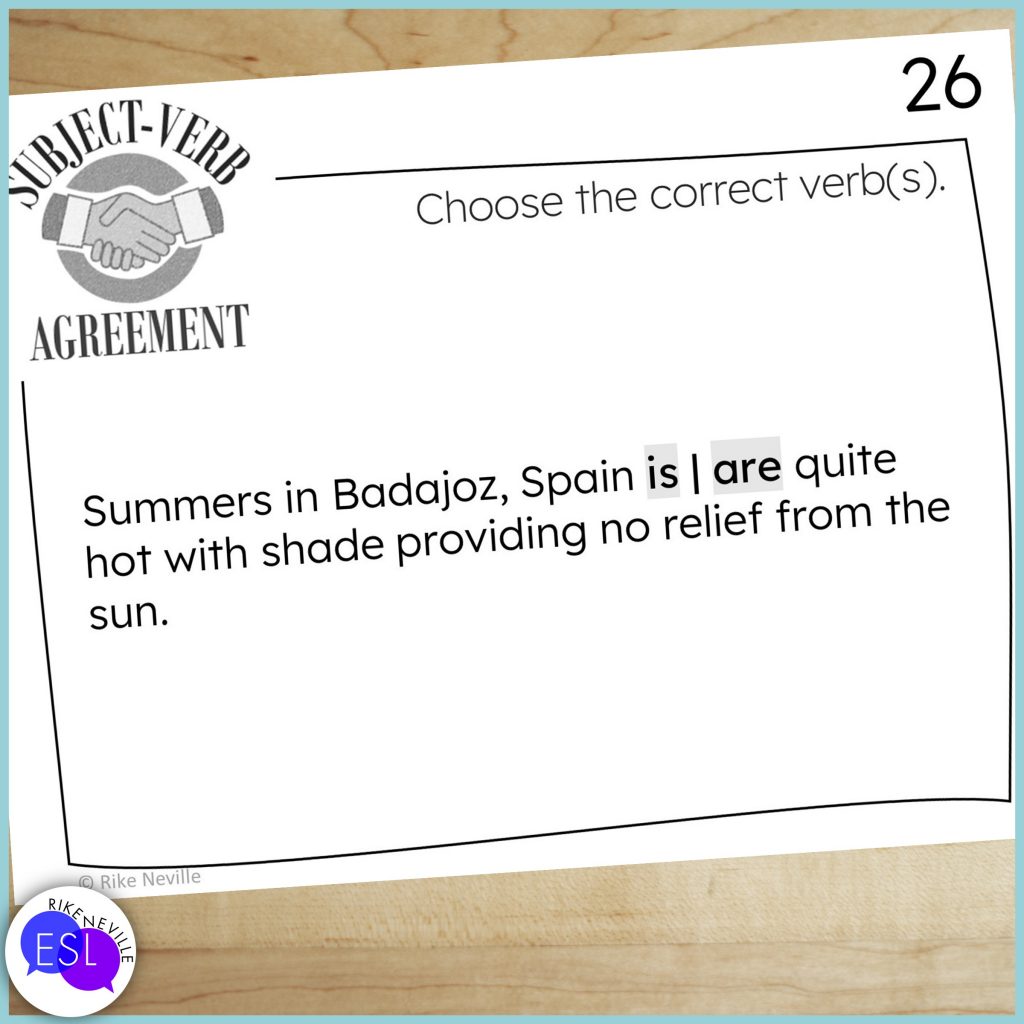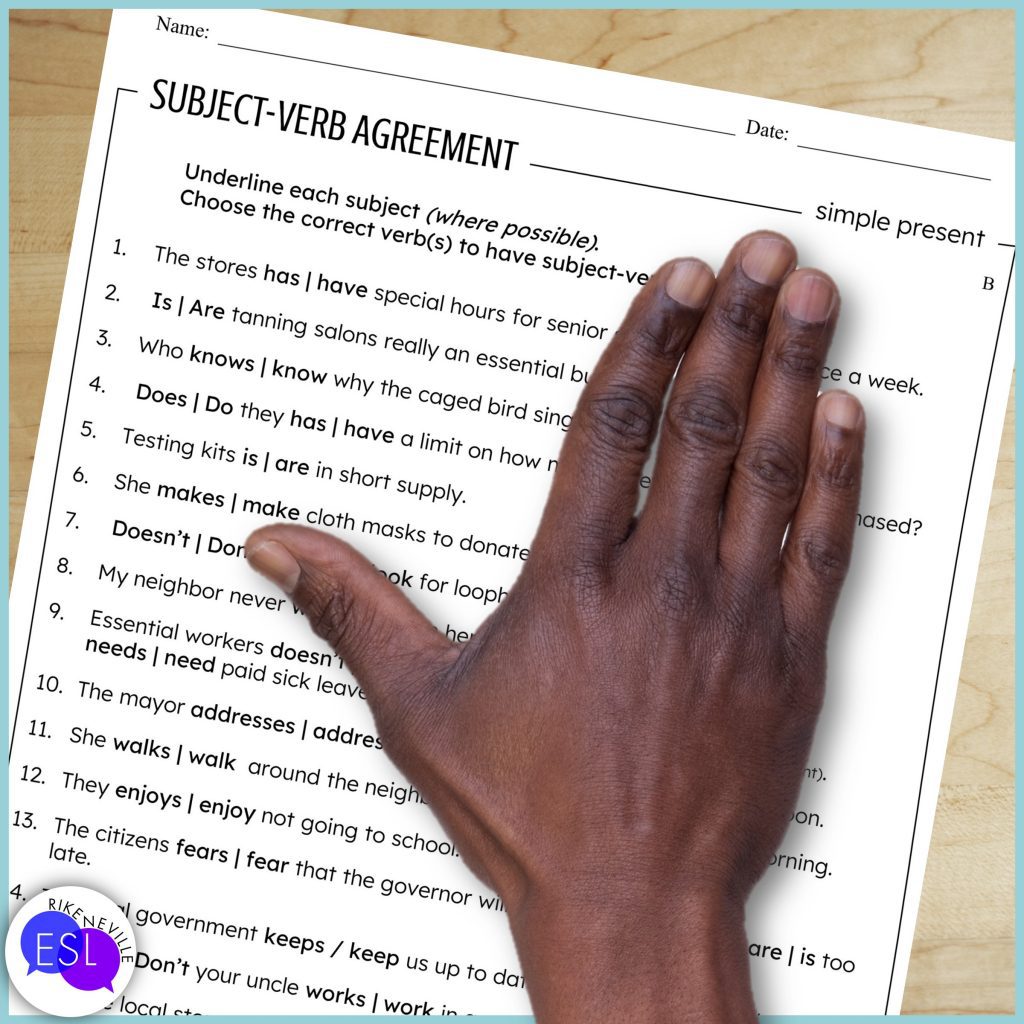Subject-verb agreement need not be a musty grammar concept!

First, let’s do a quick run-down on subject-verb agreement in case we have a new teacher reading this.
Subject-Verb Agreement in a Nutshell
What is subject-verb agreement?
Subjects must agree with their verbs. A singular subject takes a singular verb. Plural subjects take plural verbs. Sounds simple, right? Keep it that simple for your beginners. Add some of the trickier parts as they increase their fluency.
What are some examples of subject-verb agreement?
Even absolute beginners are quickly introduced to this concept with pronouns and their corresponding be verbs.

- I am
- you/we/they are
- she/he/it is
What are some common mistakes with subject-verb agreement?
- Making the verb agree with the wrong noun when more than one noun is before the verb.
- Getting confused when more than one subject is joined by and, nor, or.
- Panicking at the sight of a collective noun. Okay, not panicking. Just checking to see if you’re really reading this. But yes, collective nouns can absolutely induce errors.
- Getting thrown by a prepositional phrase (or two or three) butting in between the subject and the verb.
Now that we have that out of the way, let’s dive into how to make subject-verb agreement worksheets into games and activities. Yes, that’s right! I’m going to tell you how to take (almost) any subject-verb agreement worksheet and transform it into something that will invigorate your class and perhaps cause a little too much noise.
Don’t have any subject-verb agreement sentences on hand to use or the time to create them? I’ve got tons in my Subject-Verb Agreement Grammar Guide & Worksheets resource. Even better, the sentences in the task cards are all different!
Subject-Verb Agreement Games & Activities (divided by language domain)

Listening Game/Activity
#1 Mini-White Board Race
If you have enough mini whiteboards that each student could have one, this game is an easy way to ramp up their competitive spirit while allowing you to see who might need more practice. This works best with a worksheet that requires students to choose between two nouns or two verbs.
Read the sentence aloud and say both of the noun or verb choices. Students decide which one is correct and quickly write it on their mini- whiteboard and hold it up. You can award one point for the first correct answer or one point for every correct answer within a predetermined period of time (depending on the level and needs of your students).
Speaking Games/Activities
#2 Subject-Verb Agreement Dialogues

Create some dialogues with either the subject or verb missing for each sentence. You can focus entirely on the nouns, the verbs, or do a mix. Students read the dialogues together in pairs, filling in the missing word. They can do this at their desks/tables or in front of the class if you’ve got a group that loves to get dramatic.
#3 Subject-Verb Agreement Videos
“If you want to master something, teach it.” No matter who that quote is attributed to, we teachers know how very true it is. I certainly learned far more nuances in grammar when I had to start teaching it. So, give that opportunity to your students. Have them create a video where they teach the rules for subject-verb agreement. You can have them do this in groups, pairs, or alone. Have students make their own videos where they explain it.
Reading/Writing Games/Activities
#4 Relay Race for Subject-Verb Agreement
Choose several different worksheets on subject-verb agreement errors, enough to have one per team of 4-8 students. Tape each worksheet to the wall or board at a distance from the others Players for each team take turns coming up to the board, choosing a sentence to redo, and writing in on the board. Once they are finished, award one point per correct sentence, and perhaps a bonus point for the team that finishes first. Wildcard option: students can use their turn to change an error another student on the same team made.
Another option would be to have a stack of task cards at the front of the room for students to choose from and complete.
#5 Subject-Verb Agreement Picture Prompt
Show students a picture that depicts a lot of activity. Have your students write sentences for the picture. Encourage them to include sentences that incorporate the coordinating conjunctions and, nor, and or, collective nouns as subjects, and prepositional phrases that interrupt the subject and the verb. Award a prize to the first person to create a certain number of sentences, the person who has the widest variety of sentences, the person who made the sentences sound like a story, and so on. (If the class is small enough, I try to come up with a winning feature for each student.)
An activity for all four domains!
#6 Running Dictation
This game will require a lot of space to move about and noise-tolerant classroom neighbors. Students will work in pairs. One is the reader/speaker in each pair, and one is the listener/writer. You’ll also need several worksheets with subject-verb agreement correction sentences, enough for one page per student. Each should have different sentences, but if this is not possible, ensure that the partners of the reader/speaker students do not sit near each other.
- Put all the listener/writer students together in a row. Mark a line on the floor in front of them at a distance of six feet minimum.
- Have all the reader/speaker students at the other end of the room (or down a hallway) where you have taped one worksheet page per student. Make sure these pages are not close together so that each student can easily see their page.
- To play, the reader/speaker students read their first sentence, find and correct the error, and then run to their partner to tell the partner the sentence.
Important:
- They cannot bring the page with them.
- They may not take a photo of it.
- They must stand behind the line marked on the floor when saying the sentence to their partner.
- They can run back and forth as many times as necessary to say the sentence.
- The listener/writer students can ask their partner to repeat or spell a word. They will face the challenge of listening to only their partner’s voice as there will often be more than one reader/speaker student reciting a sentence simultaneously. This is where it can get loud.
- The winner is the pair who gets all the sentences written down correctly first!
Do these subject-verb agreement games and activities sound like fun to you? You might also like to learn about 3 Easy Hacks that will make Worksheets Exciting!
Whether you want traditional paper-based worksheets and task cards, their Easel counterparts, or the BOOM card versions, you’ll want to check these out. All will save you the time of coming up with your own sentences for the games and activities mentioned above and can all be used in their more traditional manner as well. The sentences on the grammar guide & worksheets differ from those on the task cards. The boom cards are based on sentences from the worksheets and task cards.







Temitope says
Wow! This is awesome. Thank you so much.
Rike Neville says
Hey, thanks for commenting! So glad you love it! 🙂 Have a great day~!
agatha says
Thank you for your resource materials.
Do you have similar activities on Business English?
Thank you.
agatha
Rike Neville says
Hello, Agatha~!
I’m pleased you like the resources I have to offer. Unfortunately, I don’t have anything that I would consider “business” English. I think that the closest thing I might have to offer would be the collection of discussion questions from my academic vocabulary line. You can check that out here. I hope that helps! ^_^